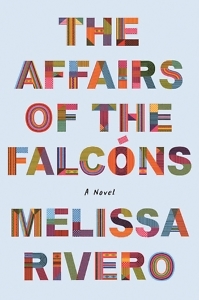Are We Supposed To Be Here?
In The Affairs of the Falcóns, Melissa Rivero explores the plight of an undocumented mother in 1990s New York
In her debut novel, The Affairs of the Falcóns, Melissa Rivero creates an indelible protagonist in undocumented, Peruvian-born Ana, whose life as a mother and wife in mid-1990s New York is a constant, perilous gauntlet. Struggling to endure increasing pressure, Ana hears her own late mother’s refrain echo in her mind, “You’ll have to do things for love” — a line that signals to Ana a range of meanings: backbreaking work, harrowing risk, bitter compromise, and moonshot hope.

Born in a dangerous provincial village in Peru, Ana has already experienced profound displacement before arriving in New York as a young wife and mother of two. After her father’s disappearance and her mother’s death, she seeks a better life in Lima, only to learn that her indigenous origins and dark skin place severe limits on her future. When her more privileged and educated husband, Lucho, finds trouble as a passionate advocate for political change in Peru, they take the calculated risk of coming to New York, without papers, to build a future in (relative) safety.
For Lucho, life in America is a come-down, his academic work replaced by a string of menial jobs. But Ana is haunted by the memory of violent, sexual threats in her home village and the prohibitive discrimination she faced in Lima. She cannot imagine going back, nor can she imagine sending back her children, as everyone seems to suggest they do. Employed as a seamstress in a textile factory, she juggles side jobs and childcare while harboring the unlikely but persistent dream that someday she’ll open her own restaurant.
During the novel’s opening chapters, a time of tremendous stress erupts in Ana’s life, largely focused on finding money for her family’s debts. She scrambles to make payments to an ambiguously dangerous loan shark nicknamed Mama and is forced to deal with the darker advances of Mama’s husband. Ana also faces uncertainty at home — that is, their borrowed room in the apartment of her husband’s proud, volatile cousin, Valeria, who wastes no opportunity to remind Ana how little she’s worth.
 Hovering over Ana’s struggles is the ever-present danger of deportation, a possibility that seems to grow closer just as her other problems balloon. In a heart-wrenching scene late in the novel, her daughter’s sharp question cuts through Ana’s attempts to downplay the threat of immigration officers. The moment points toward the nightmare of family separation: “’Are we supposed to be here?’ she asked. Ana looked into her daughter’s owl-like eyes. ‘We’re supposed to be together.’”
Hovering over Ana’s struggles is the ever-present danger of deportation, a possibility that seems to grow closer just as her other problems balloon. In a heart-wrenching scene late in the novel, her daughter’s sharp question cuts through Ana’s attempts to downplay the threat of immigration officers. The moment points toward the nightmare of family separation: “’Are we supposed to be here?’ she asked. Ana looked into her daughter’s owl-like eyes. ‘We’re supposed to be together.’”
Rivero writes from the point of view of an undocumented protagonist at a time when dangerous mischaracterizations of such lives are used to justify cruelty and neglect toward those detained and deported. Beyond its cultural or political relevance, however, The Affairs of the Falcóns finds its greatest power through its compelling, character-driven story. The novel gains momentum during its second half, as the screws of Ana’s dilemma tighten all around her. Debts multiply before her eyes. Dependence on untrustworthy adversaries threatens her self-respect and her safety. All her efforts to rein in the dangers and secrets of her life start to fray, endangering her children, marriage, reputation, and future in America.
The primary narrative of this novel unfolds within Ana’s inner world. When her best friend pushes her to explain her recent choices, she hesitates: “A part of her believed that saying her fears aloud might make them real, but some were already tangible, alive and visible for all to see.” No matter what the outside pelts at her, she must decide what to believe about herself and, from that belief, how to engage the other people in her life with courage, integrity, and trust.
The Affairs of the Falcóns’ richest strength springs from how much we come to care about Ana and her plight — not only the considerable odds stacked against her, but also how she learns to reckon with griefs from her past, wounds that resist healing, and brutal sacrifices she must make to keep her family together.

Emily Choate holds an M.F.A. from Sarah Lawrence College and is the fiction editor of Peauxdunque Review. Her fiction and nonfiction have been appeared in Shenandoah, The Florida Review, Tupelo Quarterly, Yemassee, Late Night Library, and elsewhere. She lives near Nashville, where she’s working on a novel.


